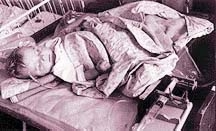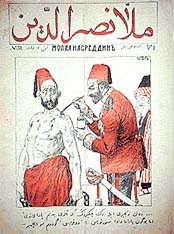
Winter 1995 (3.4)
Editorial
Health
and Medical Care
by Betty
Blair

 Health care used
to be fairly adequate in Azerbaijan under the Soviet regime.
So much so that it's hard to believe the catastrophic collapse
that has occurred these last few years since independence. Along
with education and housing, health care used to receive the Soviet's
highest priority. Everyone had access to it. And it was free.
The government was the grand daddy of all insurance companies,
picking up the tab for everybody.
Health care used
to be fairly adequate in Azerbaijan under the Soviet regime.
So much so that it's hard to believe the catastrophic collapse
that has occurred these last few years since independence. Along
with education and housing, health care used to receive the Soviet's
highest priority. Everyone had access to it. And it was free.
The government was the grand daddy of all insurance companies,
picking up the tab for everybody.
Despite its serious flaws, mostly
associated with centralized planning and control, the Soviet
Health System must be given credit for its achievements. There
were many fairly advanced medical facilities throughout Azerbaijan.
Even villagers in remote mountain passes in the Caucausus had
access to medically trained personnel. Medical education was
given high priority and many professionals received training-proportionately
more than in the West. Many specialized centers were built in
Baku, alone-Oncology, Urology, Rheumatology, Resortology, Hematology,
Ophthalmology, Diagnostic, and numerous others. Scattered across
the countryside were "Therapeutic Centers," built against
scenic backdrops of mountains or sea and located next to hot
or sulfur springs, or unique natural resources such as the
healing oil of Naftalan.
In the Soviet health system, considerable emphasis was placed
on preventive medicine or what they called "prophylactic
medicine". One of their greatest achievements was in eradicating
infectious and contagious diseases-the same dragons that are
starting to rear their ugly heads these days-tuberculosis, diphtheria,
hepatitis, malaria, polio, anthrax, cholera, typhoid, tetanus
and others.

 Left: Newborn in Sumgayit Maternity Hospital.
Summer 1995
Left: Newborn in Sumgayit Maternity Hospital.
Summer 1995
Interdependence of
the Soviet System
The medical system worked
because the Central Government had deliberately established a
network of relationships for pharmaceuticals, medical equipment
and supplies that was totally interdependent. It stretched across
that vast Soviet Empire, extending to the so-called Soviet satellites
in Eastern Europe, especially Czechoslovakia, East Germany and
Hungary.
No Republic was an entity to
itself. None were self-sufficient. The same strategic policy
was carried out in industry. A nut was manufactured in one Republic,
a bolt in another. Cotton was produced in one region, but processed
in another, often hundreds or even thousands of miles away. In
other words, the entire system was based on interdependency and
functioned as a whole. Health and medical care were no exceptions.
But with the collapse of the Soviet Union, these relationships
and links, for the most part, were broken. And the Republics,
which were left financially bankrupt, had no choice but to try
to gather their wits about them and start to rebuild an infrastructure
on their own. In Azerbaijan, two other factors clouded the horizon:
the Armenian aggression in Karabakh that has been going on now
for eight years (though a cease-fire seems to be holding). This
conflict has left more than a million people homeless as refugees
from Armenia and displaced persons within Azerbaijan try to find
a new life for themselves. Resources, both human and financial
have had to be diverted to deal with these problems.
Why Feature Health?
Our intention in this
issue is to present some of the major concerns related to health
in Azerbaijan these days. Virtually nothing is available in the
West in English about this topic. We'd like to raise some questions,
and hopefully generate some interest that will result in finding
solutions to these critical, life-threatening problems.

 Front cover
of Molla Nasraddin, satiric magazine of the early 1900s deriding
treatments that physicians give which are often worse than the
origianl ailments.
Front cover
of Molla Nasraddin, satiric magazine of the early 1900s deriding
treatments that physicians give which are often worse than the
origianl ailments.
In most parts of the world today,
especially in developing countries, you'll find long lines of
people waiting in front of hospitals and clinics. But in Azerbaijan,
there are no long lines and if you step inside the hospitals
and clinics, things are relatively quiet. There are few exceptions.
It's not that people aren't sick these days. In fact, the general
condition of health has deteriorated considerably since independence.
People have to deal with more stress with less money. One of
the first casualties is a less nutritious diet.
But avoiding hospitals, in turn, further impacts health negatively
in two major ways. With infectious diseases, the patient remains
unknown and anonymous creating the possibility for the disease
to spread further, and leaving medical officials totally helpless
in understanding the prevalence of the disease in the community.
With chronic diseases, the patient's health is likely to deteriorate
to such an extent that it may be too late to save him. If he
does survive, it's likely to take longer to recover, and more
medicine, which is not readily available, will be required which,
in turn, further drains financial resources.
Ask anyone in Azerbaijan what they would do if they got sick.
Their first reaction is an abrupt warning, "Don't!"
But if they really did become ill, their first tendency would
be to call a friend who was a medical professional. Hospitals
are considered as the last resort. When Azerbaijanis go there,
they don't expect to find medicine, and they don't expect to
receive services unless they pay bribes to the medical staff.
It's illegal but that's what is happening these days especially
since doctors, themselves, can't live off the $10-$15 salaries
that they receive each month.
One Azerbaijani observed, "We simply aren't protected anymore.
Darwin was right, It's sheer survival of the fittest. We can
die from a scratch if infection sets in." His comments seem
exaggerated. They may not be.
Lack of Reliable
Statistics
Typically, in introductory
health-related articles, statistics are presented to give the
reader a quantitative sense of the extent of the problem. We've
deliberately avoided statistics here just as we did in our Environment
issue (see August 94; 2:3). We're concerned about their reliability
and fear many of them may be misleading. To maintain accurate
statistics requires financial resources and there are no computers
or copy machines to facilitate the task as medical records are
usually written by hand.
As Dr. Jamil Aliyev, Director of Azerbaijan's Oncology Center,
pointed out, "Don't look at our hospital admissions to understand
the prevalence of cancer in our country (72). Hospital admissions
are down. But cancer incidence has probably increased. Admissions
are low simply because people can't afford to pay for the treatment."
Another cultural factor skews statistics related to hospitals.
When someone is terminally or critically ill, it's not unusual
for relatives to approach a doctor and ask to take their loved
ones home to die. Their real concern is that no autopsy be carried
out. It's unbearable for most Azerbaijanis to think of their
loved ones being cut or mutilated in any way. The medical staff
usually complies. Hospital statistics don't look as bad that
way.
Political Responsibility
In Azerbaijan's health
plan for the future, what is clearly missing is a workable strategy.
Health officials talk about constructing a top rate hospital
with top facilities and professionals which would be a "pay-for-service"
center. Some of the extra money that would be earned from this
facility would then filter to other hospitals-so they say.
It's interesting to see the oil industry at work these days tirelessly
exploring every possibility for a feasible pipeline route to
transport Azerbaijan's oil to the international market. The oil
industry has a strategy. It's clear where they intend to go and
how they plan to get there. But when it comes to medicine, no
one seems to have a serious plan or strategy, especially in relationship
to a comprehensive National Health Care Program.
Excuses are repeated over and over again like broken records-the
war, the economy, the refugees. But those are all the more reasons
why Azerbaijan has to have a plan. Without a vision, the medical
care will continue to develop haphazardly, and not just a few
people, but the majority of them will "fall through the
cracks".
While Parliament debates whether or not to privatize the medical
system, privatization has already "kicked in" at hospitals-unofficially,
of course. Generally speaking, those who can pay, receive services.
Those who can't, are out of luck.
Health is more than a personal question that can be solved on
a personal level. The body of knowledge necessary for treatment
is too vast; the preparation of pharmaceuticals and medical equipment
and supplies, too complex. The question of trying to maintain
good health and treating diseases extends across international
borders. That means that politicians and government officials
must get involved to solve the problem.
At the present, nearly all medicine, vaccines, and supplies that
are being used in the Republic are donated via humanitarian relief.
But international aid, no matter how generous it may be, or even
could be, can never by viewed as anything other than auxiliary
to a nation's medical system. Aid should never be perceived as
a solution to the national health problem because it will never
be sufficient. Even with these agencies' assistance, Baku is
still not able to take care of its everyday problems, much less
emergencies (see "The
Crisis of Beta Thalassemia").
Just as the oil industry is working
nonstop, in the same way, political officials must work for health
just as tirelessly. It's equally as critical to the welfare of
the nation.
One of the strengths of the cohesion of the Soviet system was
that decisions were made in Moscow. Local entities in the Republics,
for the most part, simply carried out orders. That's part of
the dreadful legacy for the new Republics. Too many people are
inexperienced in knowing how to plan and strategize. Too few
have been trained to make and take responsibility for major decisions.
The situation is further complicated when there is no money in
hand. But there is no choice except for Azerbaijanis to take
accountability aggressively for resolving their health problems.
The Ministry of Health must initiate carefully thought-out plans.
Ideas are what exhilarate and inspire people to act. The head
must lead, not the extended palm.
Home | About
Azeri | Learn
Azeri | Arabic
Script | Store | Contact
us
Articles from Azerbaijan
International
© Azerbaijan International. Copyright 2003. All rights reserved.
|
|